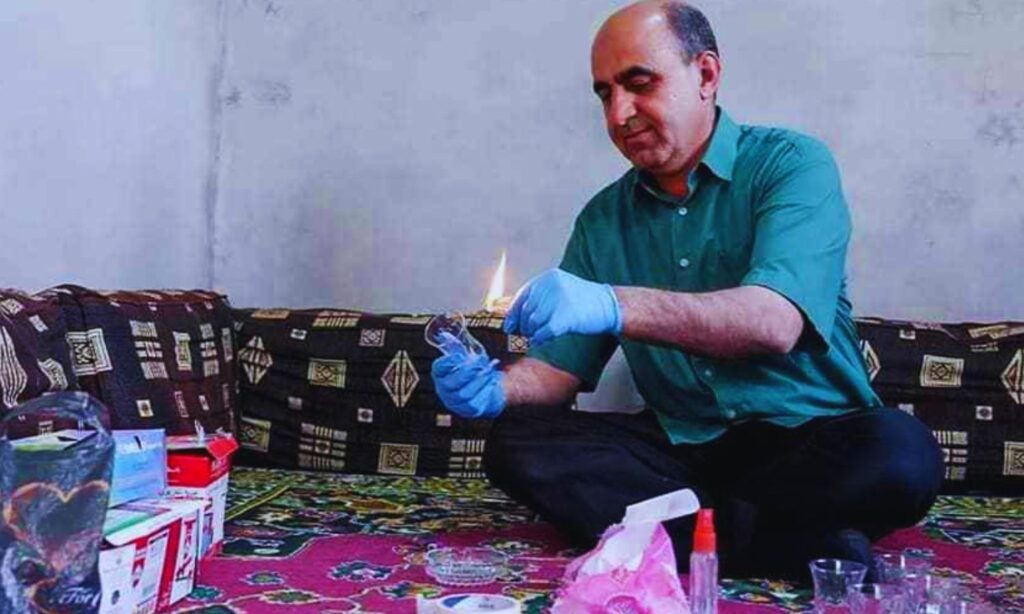Al-Hasakah – Majd al-Salem
Traveling across villages on his motorcycle, the cupping therapist Ali al-Hassan (48 years old), originally from the countryside of Qamishli, responds to appointments made over the phone and via WhatsApp for cupping sessions.
Ali told Enab Baladi that there has been a growing interest in cupping, with each year seeing a larger number of clients than the previous one, attracting people of various ages and social classes.
The practice of cupping as a form of treatment sees notable demand among the residents of al-Hasakah governorate in northeastern Syria at this time each year.
Affordable healing benefits
Cupping is a therapeutic procedure that relies on extracting “contaminated” blood and harmful bodily fluids, which could potentially cause certain diseases, or may lead to future health issues.
Al-Hassan, who holds a degree in Arabic language and is an Imam at a local mosque, has been treating people with cupping for about six years, learning and training from a formerly well-known therapist in the area.
He added that from his experience with individuals treated through cupping, it has “many benefits” such as alleviating back pain, joint pain, headaches, and migraines; improving muscle and bone health, and enhancing overall function.
According to al-Hassan, cupping has proven effective in treating some respiratory and digestive diseases, and in enhancing skin health by stimulating blood circulation and detoxifying the body. It has also been noticed to improve mood and sleep quality among those who undergo the procedure, enhancing overall well-being and mental relaxation, he noted.
Regarding the cupping process, al-Hassan mentioned that the tools and techniques have recently evolved. Now, specialized sterilized cups are used for each individual, and instead of using fire to draw blood, a special device is used to suction the air, creating a vacuum between the cups and the skin to facilitate blood extraction.
He stated that cupping can be performed on most parts of the body, most commonly on the back with three to six cups placed according to the person’s preference, and even on the head. He prefers conducting cupping sessions early in the morning on an empty stomach.
Al-Hassan does not charge a fixed fee for his services; instead, he agrees on a payment based on “the person’s ability to pay.” After arranging with a group of people, they gather at one house to conduct the cupping session.
Each person then pays between 25,000 and 50,000 Syrian pounds, and possibly less, as “the cupping therapist revives a prophetic tradition for which he receives a reward,” and although the prices are affordable, it can be performed for some “free of charge.”
The cupping therapist told Enab Baladi that the beginning of summer is his preferred time for cupping, noting that about 150 people from Qamishli and surrounding villages had undergone cupping at his place this month, acknowledging that there are other cupping therapists in the area with their clientele, including women.
High cost of treatment increases demand on cupping
Riyad al-Mutlaq (50 years old) from al-Qahtaniyah told Enab Baladi that he undergoes cupping annually and feels “both physical and psychological relief” that compels him to repeat the experience regularly.
Al-Mutlaq and others believe that the increasing popularity of cupping, in addition to it being a part of the prophetic tradition, is driven by a shift towards alternative medicine and herbal treatments generally due to the “exorbitant rise” in the prices of medical treatments, hospital expenses, and medicines.
According to al-Mutlaq, some opt for cupping as a preventive measure believing that “an ounce of prevention is worth a pound of cure’.”
Enab Baladi learned from medical equipment centers that there is a demand for purchasing cupping devices during this period of the year.
A cupping device (with a pump) along with six cups is sold for 30,000 Syrian pounds, and with 12 cups for 50,000 Syrian pounds.
Daily wages in the region are around 40,000 Syrian pounds, while the minimum salary for employees at the Autonomous Administration institutions is 1,040,000 Syrian pounds (the dollar is equivalent to 15,350 Syrian pounds).
Medical opinion
According to the National Library of Medicine, the mechanism of how cupping works is not fully understood, which has sparked considerable debate about its efficacy.
Some experts believe that its effects are merely due to the “placebo effect”, while others see genuine benefits that merit further research and study.
According to the National Library of Medicine, some evidence suggests that cupping may stimulate feelings of relaxation and calm in the body, which could help alleviate pain, improve blood circulation, remove toxins and waste from the body, potentially reducing the risk of diseases such as arteriosclerosis and cardiovascular and heart conditions.
The report emphasizes the need for more scientific research to understand the mechanisms of cupping better and determine its effectiveness in treating various medical conditions.

